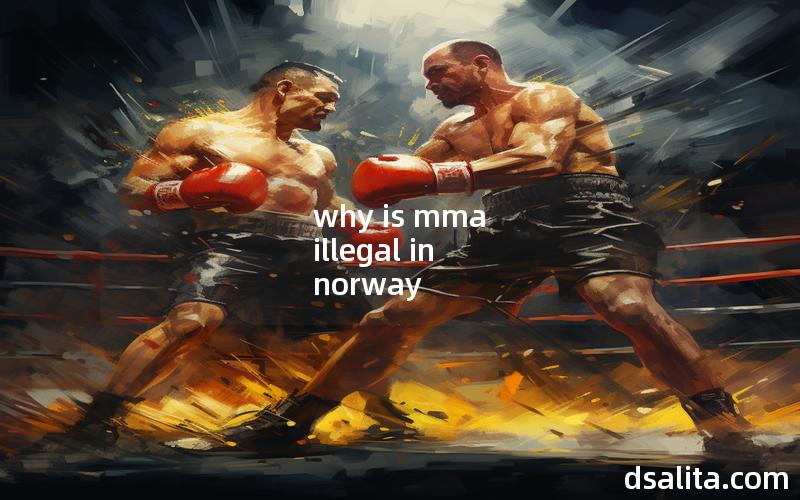Mixed Martial Arts (MMA) is a popular combat sport that combines various techniques from different martial arts disciplines. However, despite its global popularity, MMA is currently illegal in Norway. This article aims to explore the reasons behind the prohibition of MMA in Norway from various perspectives.
Cultural and Historical Factors
One reason why MMA is illegal in Norway is due to cultural and historical factors. Norway has a strong tradition of boxing and wrestling, which are considered more traditional and established combat sports. The introduction of MMA may be seen as a threat to these traditional sports, leading to resistance from cultural and historical purists.
Furthermore, Norway has a strong emphasis on fair play and sportsmanship. The violent nature of MMA, with its techniques such as strikes and submissions, may be seen as contradicting these values, making it difficult for MMA to gain acceptance in the country.

Health and Safety Concerns
Another significant reason for the prohibition of MMA in Norway is the concern for the health and safety of the athletes. MMA involves intense physical contact and a wide range of techniques that can lead to serious injuries. The Norwegian authorities may believe that the risks associated with MMA outweigh the potential benefits, leading to the ban.
Moreover, the lack of a unified governing body for MMA in Norway may also contribute to the safety concerns. Without proper regulations and oversight, there is a higher risk of unqualified individuals participating in the sport, increasing the likelihood of injuries.
Political and Legal Issues
The prohibition of MMA in Norway may also be influenced by political and legal factors. The country’s legal framework may not adequately address the specific requirements and regulations necessary for the safe and fair practice of MMA. This legal ambiguity can make it challenging for MMA events to be organized and sanctioned.
Additionally, political considerations may come into play. The government may be concerned about the potential negative social impact of MMA, such as promoting violence or influencing youth in a negative way. These concerns can lead to a reluctance to legalize the sport.
Lack of Public Support
The lack of public support for MMA is another reason for its illegality in Norway. Public opinion plays a significant role in shaping the country’s policies, and if there is a widespread perception that MMA is a brutal or dangerous sport, it becomes difficult for the authorities to justify its legalization.
Media portrayal of MMA can also influence public opinion. If the media predominantly focuses on the violent aspects of the sport, it can further solidify negative perceptions and hinder the growth of MMA in Norway.
Alternative Combat Sports
Norway already has a variety of combat sports that are legal and widely practiced. Boxing, kickboxing, and wrestling have established communities and infrastructure in the country. The presence of these alternative combat sports may make it challenging for MMA to gain recognition and acceptance.
Furthermore, the popularity of these existing sports may create a competitive environment where MMA struggles to find a niche and attract participants, leading to a lack of demand for its legalization.
International Influence
The international influence on MMA’s legality in Norway cannot be ignored. The perception of MMA as a global phenomenon may influence the authorities’ decision-making process. If other countries with similar cultural backgrounds have prohibited MMA, it can strengthen the argument against its legalization in Norway.
Conversely, if neighboring countries or influential international organizations support and regulate MMA effectively, it may create pressure on Norway to reconsider its stance and potentially lead to a change in legislation.
Educational and Awareness Gap
The lack of education and awareness about MMA among the general public and policymakers can also contribute to its illegality in Norway. If decision-makers do not have a comprehensive understanding of the sport, its rules, and its positive aspects, they may be more inclined to maintain the status quo.
Efforts to bridge this gap through education campaigns, seminars, and workshops about MMA could potentially change perceptions and lead to a more informed and open discussion about its legalization.
Conclusion
In conclusion, the illegality of MMA in Norway can be attributed to a combination of cultural, historical, health and safety, political, legal, public opinion, alternative sports, international influence, and educational factors. Understanding and addressing these various aspects may be crucial in initiating a dialogue and potentially changing the status of MMA in Norway.

 Dsalita Boxing
Dsalita Boxing






